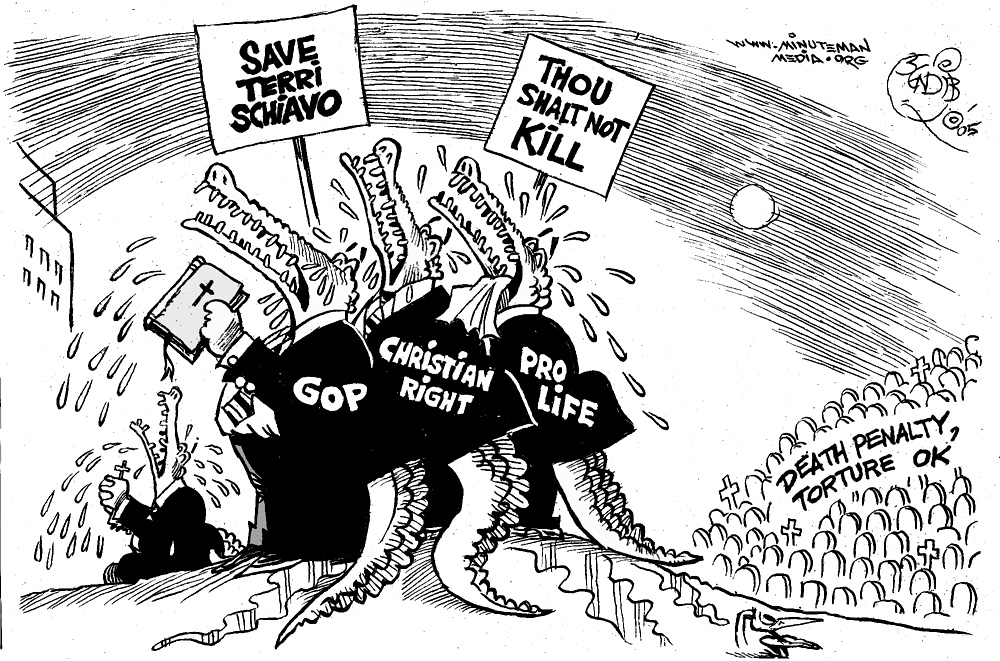



![]()
A Divided Country
Terri Schiavo divided the country into two
camps: those who supported the removal of her feeding tube and those who
did not. The tension between the two groups was decidely palpable, and
numerous editorials and political cartoons were made concerning the issue from
both camps. Below are several examples of the types of political cartoons
that circulated during the time.



However, to gain a full understanding of the conflict between the two camps, one must have an understanding of the philosophical systems that support each point of view.
![]()
Philosophies Supporting Michael Schiavo
Michael Schiavo's decision to remove his wife's feeding tube is not a decision that one makes spontaneously. Such a decision could be said to be the result of a few different philosophical schools.
British Empiricism -
According to the philosophical school of British Empiricism established by Locke, Berkeley, and Hume, the moral quality of all actions has its basis in emotions from past experiences. Additionally, this train of thought held to empirical skepticism. The combination of these two tenets rationalize Michael Schiavo's actions.
If the moral quality of all actions has its basis in previous emotional experiences, then all morals are individual without any universality. Thus, Schiavo could say with a free conscious that he was not engaging in an act to kill his wife or to willfully bring her harm. He based his decision on morality--a morality that is not universal--that was decided by his previous experiences. Furthermore, if morality is individual and not universal, the rationalization of any action becomes, in a sense, much easier.
Empirical skepticism, which denies causality and logical knowledge, would deny any possibility of Terri Schiavo of having made a full recovery due to the abundance of empirical knowledge pointing to such a fact. Since this skepticism is empirical, its basis is only in knowledge that can be proven empirically, denying the possibility of logical deducing new conclusions or holding to the idea that a "supreme being" could return her to full health.
Schopenhauer's Reaction to German Idealism -
According to Arthur Schopenhauer's philosophy, man's ultimate goal is to escape from an individual existence and its limitations upon universal will, which should never be limited. Accordingly, all actions should be ones for the assertion of the will.
By following this thought, Michael Schiavo acted correctly, since he ended the greatest problem afflicting Terri Schiavo: he removed the limitation upon her universal will. Since the will is all important to Schopenhauer, any limitation placed upon it must be removed. Michael Schiavo acted in complete accordance with this philosophy when he removed the supreme limitation upon Terri Schiavo's wil--the feeding tube.
In addition, Schopenhauer condones suicide, since it is an assertion of the will over individual existence. One could make the logical argument that since Schopenhauer condones the use of suicide, he would support the use of euthanasia, which is, in a form, what Michael Schiavo did.
![]()
Philosophies Supporting the Protesters of Michael Schiavo
Those who disagreed with Michael Schiavo's decision to remove his wife's feeding tube did so because of adherence to a philosophical system that allowed for suffering.
Stoicism -
The philosophy of Stoicism, founded by Zeno, values a resignation to fate and believes that one can retain happiness even during physical suffering.
By saying that the feeding tube should remain, some of those who protested exemplified the thought of Stoic apathea. For the Stoics, one should not fight against his fate but should instead resign himself to it. What Michael Schiavo did was an act against fate, since he acted to change the fate of Terri Schiavo and to determine himself what would happen to her, which for a Stoic is the sole province of Fate.
Additionally, Stoicism believes that happiness can be retained during suffering, since happiness was an internal entity that did not entail external realities such as pain. That Terri Schiavo was suffering or in pain is not of consequence, since one can still be happy in those states.
Thomism -
Thomism, the philosophy based on the writings of St. Thomas Aquinas, values the human life from conception to natural death and believes in both redemptive suffering and the thought that suffering can improve a person's quality of life.
If one adheres to the thought of valuing life from conception to natural death, the act of euthanasia that Michael Schiavo performed is completely antithetical, while those that acted to prevent the removal of the feeding tube were being consistent with this philosophical belief. Thomism states that all life, especially the innocent and defenseless, is precious and must be protected by the strong. Michael Schiavo's actions against his wife violated this tenet, since he should have acted to protect her rather than perform a measure that would result in her certain death.
Thomists, who hold to redemptive suffering and the notion of suffering improving a person's life, would view Michael Schiavo's actions ones that would prevent his wife from gaining the benefits of her suffering and from being able to use that suffering to improve a person's life, such as how Terri Schiavo's immediate family used her suffering to grow more in their lives. By prematurely ending her suffering, Michael Schiavo removed an instance for personal growth and responsibility to his wife and ended her ability to gain the benefits of redemptive suffering.
"This site was created for an honors course at Monmouth College by students."